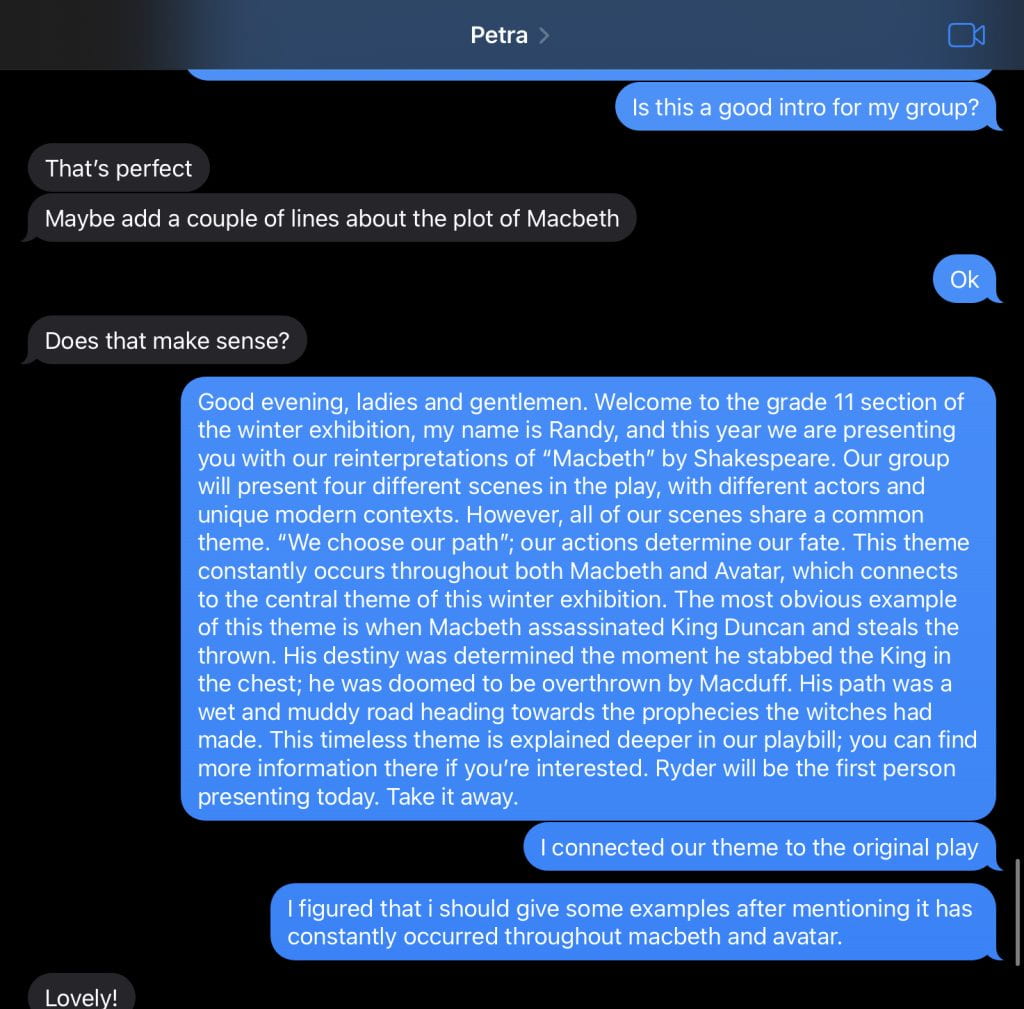“Thank you for coming to my presentation of learning. I am the expert on my own learning. I am also responsible and accountable for my own learning. You can expect me to give an honest evaluation of my progress. We will discuss my strengths and opportunities for growth. Thank you in advance for listening and for offering feedback that I can use to improve as a learner.”

How have I demonstrated growth as a learner so far this year?
As stated in my learning plan, I want to achieve 94% or higher in Humanities this year. I have analyzed some mistakes I’ve made throughout the years and devised some plans. I was pretty confident that I could achieve at least 90% this year.
Humanities is relatively subjective compared to other subjects like Math or Physics. Since PLP is a project-based learning program, there aren’t any “one for all” criteria for getting 100%. We are given the baseline expectations for being accomplished (80%), but if you want to be on the next level, you have to show a more profound understanding. To me, it wasn’t always the easiest to be “Real-world,” “Insightful”, and “Exemplary”, as these words could differ a lot based on the assignments.

There has been times when I thought I was for sure going to get a rainbow, but ends up being a sun. I would receive feedback and comments in Showbie from the teachers, telling me “this needs a bit of work”, or “demonstrate more thinking” etc. But by then, there would be new assignments due, and I usually wouldn’t make revisions because I thought a ☀️ was good enough. This kept on happening in grade 10, which is why I only got an 86%.
I was always on the passive side of being graded. It was always me looking at the baseline expectations, doing a little bit extra, and handing in my work hoping for a 🌈. It was always me guessing if my work is up to standard. The next thing I see in my hand in spot, a ☀️.
This year I decided to change. Instead of being graded, I wanted to earn my grade. Why guess if my work is up to standard if I can just ask. Why make revision after submissions, why not before. I want to be on top of my learning, a proactive learner instead of a reactive person. I want stop telling myself “it’s good enough”, instead, I want to be proud of my work, and the grade I’m getting. This took me four years to realize, but it’s never too late.
The teachers are always there to help, at tutorial time in the morning, in the classroom sitting in a corner, or even on iMessage. They are there to help us to achieve our desired grades. I figured that I should just seek feedback from the teachers more often. Not only will this improve the quality of my work, but also make me a more motivated student. I would come to tutorial time whenever I’m working on an important assignment. When I’m finished, I’d ask for feedback, and make revisions before I hand things in. This way, I can make sure that I am extending 100% of the time.
At the end of the day, the PLP teachers are the ones writing our report cards. By seeking feedback from them, it is much more effective than blindly guessing whether is my work is “good enough”.
Did I reach my learning expectations?
Yes, I did. Looking back on my most recent projects, I have grown a lot as a PLP learner. I followed the plans I made in the beginning of the year, and they did lead me to success. Not to brag, but I harassed Mrs.Willemse to give me feedback through messaging almost every single day; even on weekends and holidays.

I worked hard in school, and became responsible for my own learning. In the “Manhattan project”, I prepared my speech almost perfectly. I wrote my script ahead of time and made several revisions. In fact, I was the first person in our class to have a completed script. The Manhattan project speech was my very first time doing a speech, it wasn’t perfect but it’s a good starting point. All the assignments that I completed within that project is done to the best of my ability, and I can safely say that I’m proud of my work.

My second learning example would be the Winter Exhibition. In the “Macbeth” project, we studies one of Shakespeare’s plays and performed them live at the exhibition. We had chosen our own scenes, and connected them to “Avatar”. We are asked to communicate with our modern audience through Shakespeare’s language, but in modern context. I decided that it would be a good idea to recreate Act 3 scene 1 in North Korea, and use the assassination of Kim Jong-Nam as my modern context. Overall this project went smoothly, and the final product was a success:
I demonstrated deeper thinking when we were doing theme analysis in class. I even went out of my way to do extra research on Macbeth’s themes. Comparing to last year, I have had a lot of improvements when it comes to communicating with my teachers. I asked Mrs.Willemse for feedback on my script, playbill, and the introduction I wrote for my group. I finished my assignments ahead of time, just so I can ask for feedback and make revisions. I utilized tutorial time and Messaging really well this year, and highly increased my productivity.